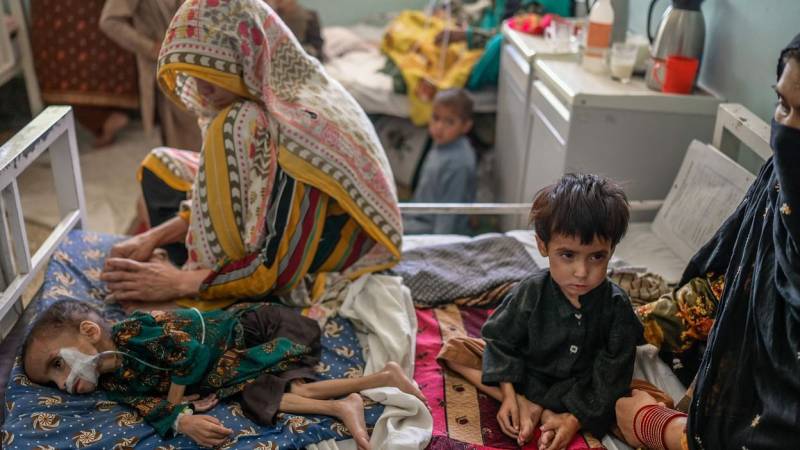'We lack everything': Afghanistan's health system at breaking point

Stay tuned with 24 News HD Android App

At an overcrowded hospital in Afghanistan, the few remaining doctors and nurses try urgently to treat skeletal babies and malnourished children packed side by side on beds.
The country's healthcare system is on the verge of collapse following the Taliban takeover in August when international funding was frozen, leaving the aid-reliant economy in crisis.
"We lack everything. We need double the equipment, medicine and staff," said Mohammad Sidiq, head of the paediatric department at the Mirwais hospital in the southern city of Kandahar, where there are twice as many patients as beds.
Many staff have quit after not being paid for months, while others have fled abroad fearing Taliban rule, with many women too afraid to return to work under the hardline Islamists.
Sidiq said there had been an influx of patients as access to the hospital improved following the end of Afghanistan's 20-year conflict, straining resources further.
At just 5.5 kilograms (12 pounds), one 11-month-old baby at the hospital weighed just half what the infant should.
A severely malnourished five-year-old with diarrhoea and pneumonia lay motionless and was being fed through a tube. He weighed just 5.3 kilograms.
"I could not bring him to hospital before because there was fighting," the boy's mother said.
At another hospital in the northern town of Balkh, a medic said the number of patients had also shot up.
"In the past, the roads were closed due to the war and people could not come to the hospital, but now their number is much higher than before," Muzhgan Saidzada told AFP.
"Of course, it has become more difficult to handle," the doctor at the Abo Ali Sina Balkhi Regional Hospital said.
Imminent collapse
After the Taliban swept to power the World Bank suspended aid to Afghanistan, while Washington denied the Islamist group access to the country's gold and cash reserves, most of which are held overseas.
The International Monetary Fund also said Afghanistan would no longer be able to access the global lender's resources, blocking hundreds of millions of dollars.
Other major donors such as USAID and the European Union have paused funding with no emergency support in place.
Leading aid agencies now say the health sector, which was primarily run by NGOs with international funding, faces "imminent collapse".
HealthNet TPO, a Dutch aid agency which runs the Afghan Japan Hospital in the capital Kabul, said its 2,700 healthcare workers in Afghanistan would go unpaid and services would stop unless emergency money is provided.
At least 2.6 million people rely on the group for medical services at its 100 health centres and hospitals across the country.
The International Federation of Red Cross and Red Crescent Societies said more than 2,000 health facilities had already been shuttered across the nation.
At least 20,000 health workers are not working, or are doing so without pay, it said, including over 7,000 women.
Covid woes
Meanwhile, Covid-19 continues to spread across the country, with few resources to bring it under control.
"Maybe in a month, we will not be able to provide for our Covid-19 patients," said Freba Azizi, a doctor for Kabul's only dedicated coronavirus treatment centre at the Afghan Japan Hospital.
"The death rate of Covid-19 patients will increase," she told AFP. "We will see dead bodies on a daily basis."
One patient, a 32-year-old man, died during AFP's visit to the hospital. He was suffering from severe pneumonia and went into cardiac arrest.
Noorali Nazarzai, a doctor at the centre, told AFP he and his colleagues -- including fellow medics, nurses, managers and other essential workers -- had not been paid in three months.
According to official data compiled by AFP, Afghanistan has recorded 155,000 Covid-19 infections with around 7,200 deaths. But health experts agree a lack of testing means this is a vast underestimate.
A Johns Hopkins University tracker shows only about 430,000 people have been fully vaccinated -- just one percent of the population.
Aid hope
As the healthcare system struggles, the country remains mired in poverty and food prices are rising.
More than 18 million Afghans -- over half the population -- are in dire need of aid, while a third are at risk of famine, according to the United Nations.
The international community has pledged $1.2 billion in humanitarian assistance, but it is unclear how and when the money will reach Afghanistan.
UN chief Antonio Guterres said he believed the cash injection could be used as leverage with the Islamist extremists to exact improvements on human rights, amid fears of a return to the brutal rule that characterised the first Taliban regime from 1996 to 2001.
Some lifesaving aid has started to trickle in, with several aircraft carrying UNICEF, Save the Children and World Health Organization supplies arriving since late September.
The WHO said it has airlifted around 185 metric tonnes of essential medical supplies, including Covid-19 and trauma kits, antibiotics, and rehydration salts.
